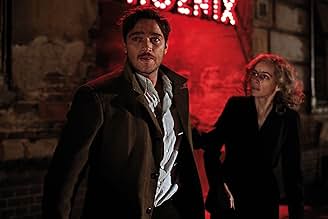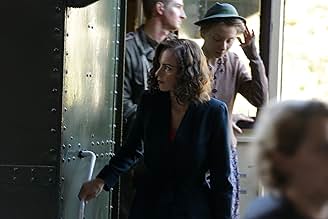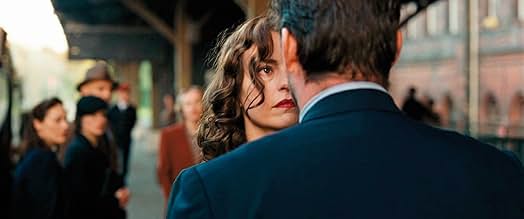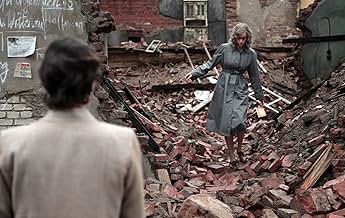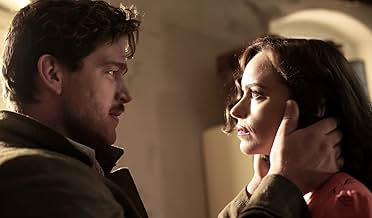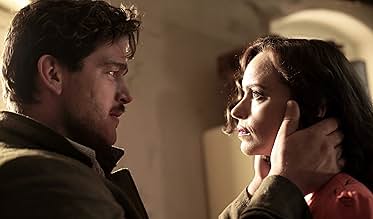After surviving Auschwitz, a former cabaret singer has her disfigured face reconstructed and returns to her war-ravaged hometown to seek out her gentile husband, who may or may not have betr... Read allAfter surviving Auschwitz, a former cabaret singer has her disfigured face reconstructed and returns to her war-ravaged hometown to seek out her gentile husband, who may or may not have betrayed her to the Nazis.After surviving Auschwitz, a former cabaret singer has her disfigured face reconstructed and returns to her war-ravaged hometown to seek out her gentile husband, who may or may not have betrayed her to the Nazis.
- Awards
- 17 wins & 30 nominations
- Tänzerin
- (as Valerie Koch)
- Director
- Writers
- All cast & crew
- Production, box office & more at IMDbPro
Storyline
Did you know
- TriviaThis is the fifth out of Christian Petzold's seven feature films to feature actress Nina Hoss. Also, it's his second film in a row after Barbara (2012) to star Hoss and Ronald Zehrfeld in the leading roles.
- GoofsThe actor playing the US Army Sergeant sentry at the checkpoint is clearly German: while he speaks English well, his German accent still comes through.
- Quotes
[first lines]
Lene Winter: [arriving at the border]
Soldat an der Brücke: Passport... Nice car. Where did you get it from?
Lene Winter: It's from Switzerland.
Soldat an der Brücke: Just like you?
Lene Winter: Like me.
Soldat an der Brücke: [whistles to the gate] They're from Switzerland. The girl too.
[to her passenger]
Soldat an der Brücke: I want to see your face.
Lene Winter: Can I talk to you?
[gets out]
Lene Winter: Come on, she's not Eva Braun.
Soldat an der Brücke: Of course not. The bitch got killed by her husband.
Lene Winter: She's from the camps.
- SoundtracksSpeak Low
Music by Kurt Weill
Lyrics by Ogden Nash
Performed by Nina Hoss and heard as a theme over the credits
If this brings to mind the idea of Nicolas Cage and John Travolta swapping faces in the awesomely bad "Face/Off", then you're not far off the mark. But listen up, here's why it works perfectly.
The theme of "Phoenix" involves how people face an unacceptable past. There are 3 main characters who each personify a particular, extreme response. It has to be extreme, it has to be preposterous, and most importantly we have to accept it. Either that or just walk out of the theater after 5 minutes and watch Monday night football instead. Our 3 characers are: 1) Nelly - she cannot let go of her traumatic past, and at the same time she has no past because she has no identity, figuratively and literally. 2) The husband "Johnny" - he utterly rejects the past, for reasons you'll figure out soon enough, and so he refuses to recognize his wife. In fact, we get the feeling that even if she were the spitting image of herself, he would still refuse truth. Such is the nature of psychological denial. And 3) We have Nelly's only friend "Lena" who has become a tireless political activist, saving survivors and trying to keep the past "alive" even though she is confronted with a society that has already moved on.
So you see how this story isn't supposed to be taken as a literal drama but rather as a very creative metaphor to illustrate how psychology works in 3 vastly different personality types. Further driving the surreal nature home, we have gorgeously shot, vividly composed visuals. If you ever wondered how Film Noir would look in color, then look no further. There have been a few contemporary classics which sought to bring Film Noir into the modern age, such as 2005's "Sin City" with its introduction of red to the crisp b&w palette, or before that was 1994's "The Crow" with its use of extreme darkness and "dead" colors. Here in 2014's is the next decade's evolution. In this case there is bold use of colors, but they are distinctly and "impossibly" presented: a dark alley is illuminated with a ghostly red light even though there are no red light sources to be seen, or a dark scene of bombed out ruins has unrealistic islands of light illuminating patches of rubble, all in vivid color but with stark contrast against the black spaces. The cinematography and lighting is as purposely unrealistic as the plot.
Ultimately if you grasp all of this, or if you just decide to go along with it for the sake of seeing how everything turns out, your suspension of disbelief will be amply rewarded. As nearly every other reviewer has noted, the ending is fantastic. Beyond fantastic, it's the whole point of the movie. In an interview, director Christian Petzold says the entire story comes down to the last 3 minutes, and that's where it will either come together or utterly fall apart. For my money, it's a total winner. "Phoenix" definitely does NOT crash & burn.
- How long is Phoenix?Powered by Alexa
Details
- Release date
- Countries of origin
- Official sites
- Languages
- Also known as
- Фенікс
- Filming locations
- Legnica, Dolnoslaskie, Poland(Berlin in 1945)
- Production companies
- See more company credits at IMDbPro
Box office
- Gross US & Canada
- $3,184,472
- Opening weekend US & Canada
- $30,296
- Jul 26, 2015
- Gross worldwide
- $5,855,623
- Runtime1 hour 38 minutes
- Color
- Sound mix
- Aspect ratio
- 2.39 : 1
Contribute to this page



